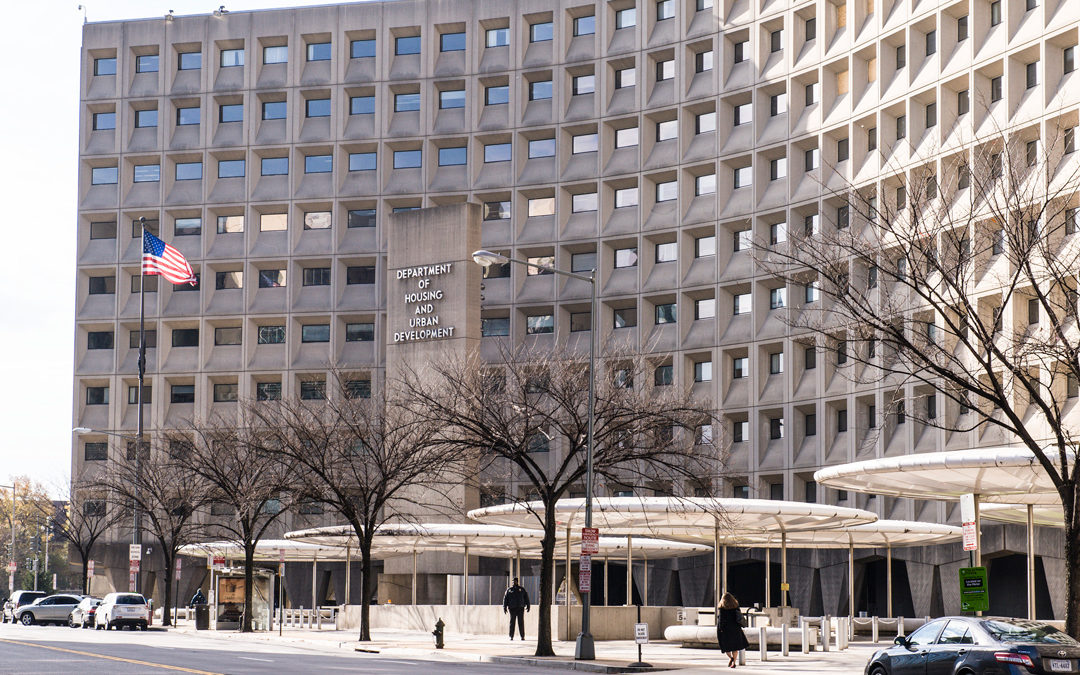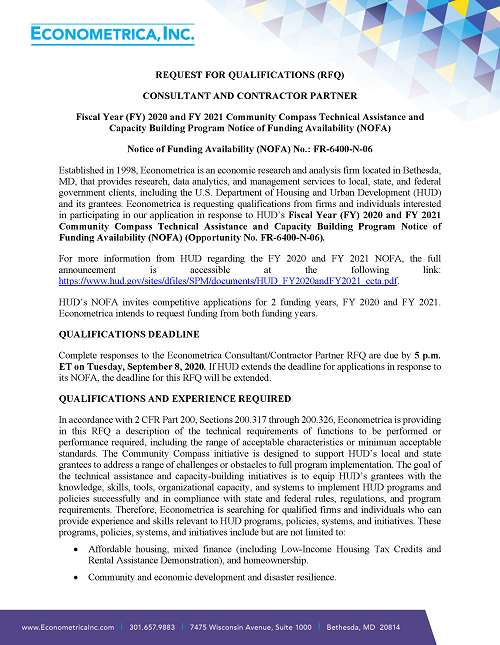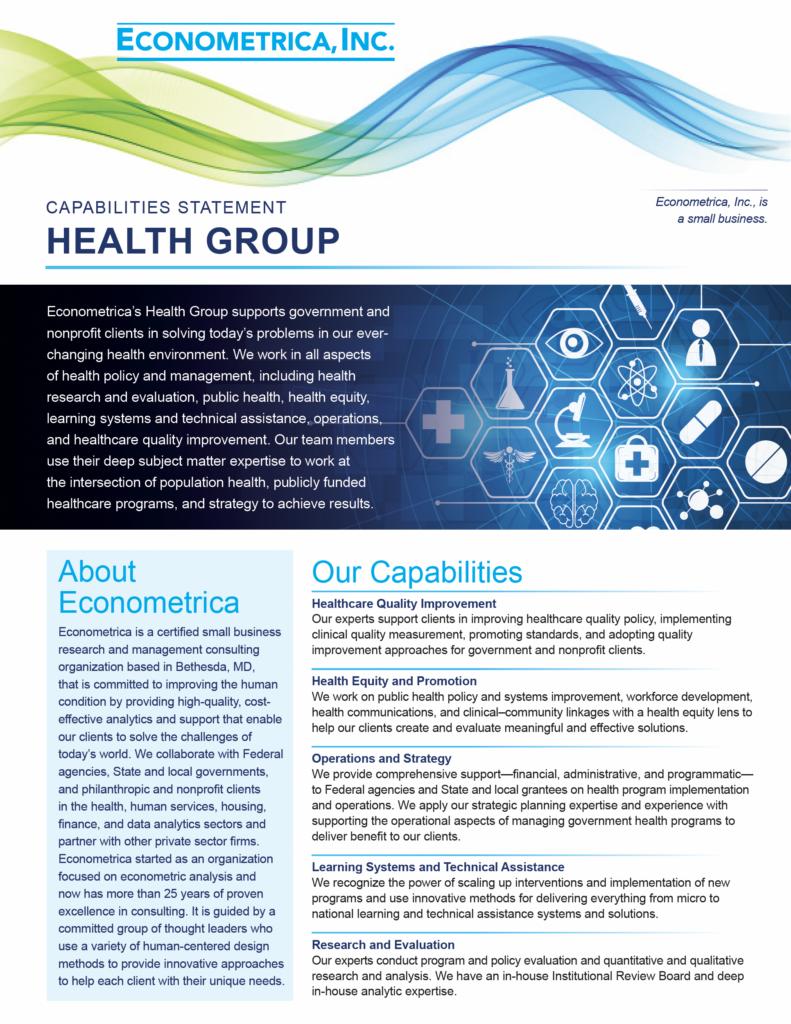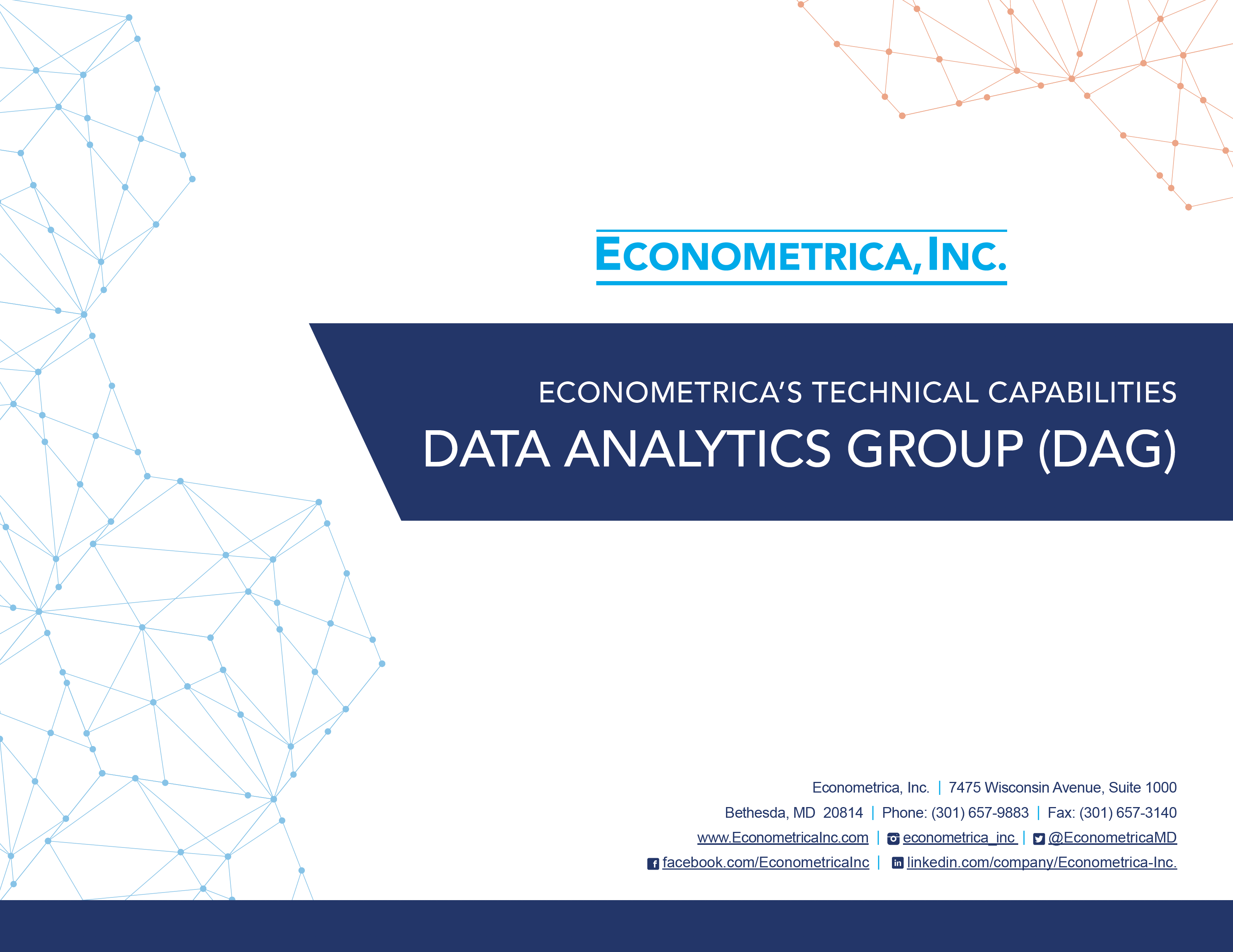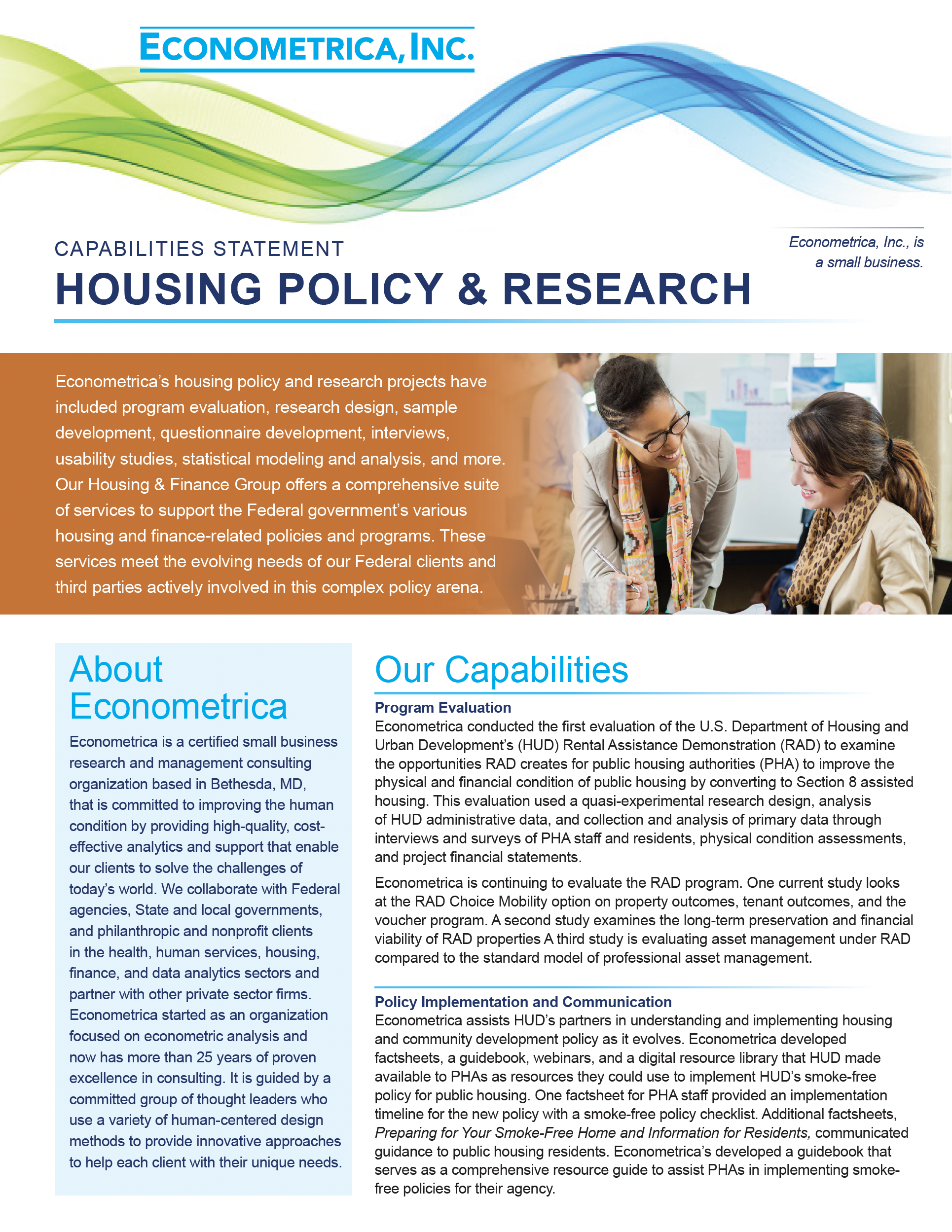Request for Qualifications (RFQ)
Consultant and Contractor Partner
Fiscal Year (FY) 2020 and FY 2021 Community Compass Technical Assistance and
Capacity Building Program Notice of Funding Availability (NOFA)
Notice of Funding Availability (NOFA) No.: FR-6400-N-06
Established in 1998, Econometrica is an economic research and analysis firm located in Bethesda, MD, that provides research, data analytics, and management services to local, state, and federal government clients, including the U.S. Department of Housing and Urban Development (HUD) and its grantees. Econometrica is requesting qualifications from firms and individuals interested in participating in our application in response to HUD’s FY 2020 and FY 2021 Community Compass Technical Assistance and Capacity Building Program NOFA (Opportunity No. FR-6400-N-06).
For more information from HUD regarding the FY 2020 and FY 2021 NOFA, the full announcement is accessible at the following link: https://www.hud.gov/sites/dfiles/SPM/documents/HUD_FY2020andFY2021_ccta.pdf.
HUD’s NOFA invites competitive applications for 2 funding years, FY 2020 and FY 2021. Econometrica intends to request funding from both funding years.
Consultant/Contractor Partner RFQ Submission Deadline
The priority deadline has passed; however, Econometrica is now accepting applications on a continuous and rolling basis. Consultants and subcontractor firms with specialized skills and experience in the areas of economic development, affordable and assisted housing programs, community development, and disaster resilience and recovery are important members of our team. Experience with HUD data systems is a plus. Bilingual applicants are encouraged to apply. Please consider reviewing the application requirements and submitting a response to join our team.
Qualifications and Experience Required
In accordance with 2 CFR Part 200, Sections 200.317 through 200.326, Econometrica is providing in this RFQ a description of the technical requirements of functions to be performed or performance required, including the range of acceptable characteristics or minimum acceptable standards. The Community Compass initiative is designed to support HUD’s local and state grantees to address a range of challenges or obstacles to full program implementation. The goal of the technical assistance and capacity-building initiatives is to equip HUD’s grantees with the knowledge, skills, tools, organizational capacity, and systems to implement HUD programs and policies successfully and in compliance with state and federal rules, regulations, and program requirements. Therefore, Econometrica is searching for qualified firms and individuals who can provide experience and skills relevant to HUD programs, policies, systems, and initiatives. These programs, policies, systems, and initiatives include but are not limited to:
- Affordable housing, mixed finance (including Low-Income Housing Tax Credits and Rental Assistance Demonstration), and homeownership.
- Community and economic development and disaster resilience.
- Community Development Block Grant (CDBG) program.
- Public housing operations and programs, including public housing accounting, Moving to Work, and Section 3.
- Choice Neighborhoods, Promise Zones, and Opportunity Zones.
- Disaster Recovery Grant Reporting (DRGR), Integrated Disbursement and Information System (IDIS), Line of Credit Control System (LOCCS), Section 3 Performance Evaluation and Registration System (SPEARS), Physical Needs Assessment (PNA), and Energy and Performance Information Center (EPIC).
- Supportive housing and services.
- Housing preservation, tenant participation, and capacity building.
- Policy Development and Research (PD&R).
- Fair housing, procurement, Davis-Bacon, energy and environment, and other cross-cutting requirements.
- Workforce development.
Evaluation Criteria
All submissions received will be reviewed against the following selection criteria:
- Experience and Technical Qualifications: The extent to which each respondent demonstrates skills and abilities related to the description above and acceptable experience with Econometrica, as applicable.
- Rate Reasonableness: The extent to which rates are considered reasonable compared to the respondent’s experience and qualifications, market prices, and any rate limitations imposed by HUD. Before assigning a funded task, rates must be determined to be fair and reasonable. Respondents must be able to provide evidence of their past pattern of compensation. This evidence includes customary rates, including rates on non-government contracts or cooperative agreements.
- Please note: Due to HUD restrictions on approval of hourly consultant rates of $200 or above, Econometrica may need to request additional documentation and rate justification from a consultant to provide to HUD for approval.
- Debarment/Suspension Check: Potential consultants found to be suspended or debarred from federal government business will not be solicited for or awarded task orders. This status is verified by searching the System for Award Management: https://www.sam.gov.
- Small Business: Econometrica is committed to utilizing small disadvantaged businesses, minority-owned firms, American Indian- and Alaska Native-owned firms, veteran-owned firms, and women’s business enterprises whenever possible.
All consultants will be selected in compliance with the procurement procedures and standards codified in 2 CFR 200. Selection of consultants will be competitive, as required by 2 CFR § 200.320.
Qualified Applicants
The qualifications and experience of selected individual consultants or partner firms may be included in Econometrica’s application to the NOFA. Those included may also be asked to assist with contributing expert knowledge in areas of the application response.
Instructions for Submission
- Review and respond to only the required Experience Form tab/worksheet 4 found in the attached Excel Workbook entitled “1.C. Applicant Summary, Interest, Capacity & Experience Workbook-REQUIRED.”
- Once you have completed the required Experience Form, email the Excel file along with the following documents to FY2020NOFA@EconometricaInc.com. Please use the subject line “Your Name – FY2020 NOFA.”
- A scanned copy of the signed and dated Participation Agreement found in Appendix A of this RFQ.
- Professional resumes for each individual included in the completed Experience Form.
- Hourly rates for everyone included in the completed Experience Form.
- Three professional references for work completed within the last 3 years. The references should be nonfamilial and not an Econometrica staff member. Please provide the following for each reference:
- Contact name (first, last).
- Title/role.
- Organization.
- Email.
- Best phone.
The following instructions apply to the Experience Form (tab/worksheet 4) in Excel Workbook entitled “1.C. Applicant Summary, Interest, Capacity & Experience Workbook-REQUIRED”. REMEMBER you are ONLY required to complete the Experience Form. Econometrica as the Prime Applicant will complete the other tabs/worksheets.
- For each staff person, consultant or partner organization populate the following (first and last); organization name, city, state, ZIP Code, and DUNS or unique identifier; role (in relation to you/your firm) and qualifications narrative.
- For the qualifications narrative, provide a summary of the individual’s experience, expertise, and other qualifications relevant to the activities included in the Community Compass NOFA.
- Use the “+” links (above the dark gray columns) to expand and show the relevant programs/topics in each HUD Office. To hide/collapse those programs/topics, use the “–” links.
Note: For each person listed, there are two steps to document years of experience:
- Enter the years of experience for each program/topic column.
- Enter the total number of unduplicated years of experience associated with each HUD program area.
For example, if Jane Doe has 5 years of experience with CDBG entitlements (2011–2016) and 8 years (2008–2016) with CDBG Disaster Recovery programs, the applicant would include 5 and 8 under the relevant program topics. Then, for the total years for the CDBG program, the applicant would include 8 years to represent unduplicated years. When entering the number of years of experience relevant to each program/topic, include only whole numbers; do not include text or decimals.
For this chart, 1 year means “10 months or more.” For instance, if a person has 9 months of experience, that person would be considered to have 0 years of experience, while a person with 5 years, 11 months of experience would be considered to have 6 years of experience.
Note: There are two columns under the Additional section that require a Yes or No response, rather than a numeric answer: the “Completed Administration and Rental Housing Compliance Certification courses” column and the “Bilingual (Spanish)” column.
Questions and Inquiries
Respondents are encouraged to submit questions about this RFQ in writing to: FY2020NOFA@EconometricaInc.com. Please use the subject line “Your Name – FY2020 NOFA Questions.”
Press contact: Jonathan Fusfield, JFusfield@EconometricaInc.com

